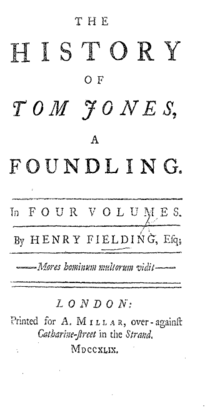 Now this was more like it! We start off with getting a bit more insight into Capt. Blifil, who when not having to spend time with his wife, spends his time lost in his own thoughts, which were
Now this was more like it! We start off with getting a bit more insight into Capt. Blifil, who when not having to spend time with his wife, spends his time lost in his own thoughts, which were
were entirely employed on Mr. Allworthy’s Fortune; for, first, he exercised much Thought in calculating, as well as he could, the exact Value of the whole: which Calculations he often saw Occasion to alter in his own Favour: And, secondly and chiefly, he pleased himself with intended Alterations in the House and Gardens, and in projecting many other Schemes, as well for the Improvement of the Estate as of the Grandeur of the Place. For this Purpose he applied himself to the Studies of Architecture and Gardening, and read over many Books on both these Subjects; for these Sciences, indeed, employed his whole Time, and formed his only Amusement. He at last completed a most excellent Plan: and very sorry we are, that it is not in our Power to present it to our reader, since even the Luxury of the present Age, I believe, would hardly match it.
Y’know, just in case anyone forgot what he was really in love with when he entered into this marriage. One evening, while strolling by himself, “his Heart was exulting in Meditations on the Happiness which would accrue to him by Mr. Allworthy’s Death, he himself—died of an Apoplexy.” Yup. That’s right. Forty-seven pages after his introduction—seemingly as a major impediment for Tom to overcome—he’s dead. We spent so much time on him, his relationship with his wife and brother-in-law, etc. and he just dies in a sentence. Well, that’s not true, it seems like he does, but we end up spending a few more pages on his being pronounced dead after this, but that’s beside my point. In some books, I’d be annoyed by this, but I was amused by this little bit of fakery on Fielding’s part.
The hullabaloo surrounding finding his body, trying to resuscitate him and so on does give Fielding a chance to satirize the practice of medicine, which I enjoyed.
Which brings us to Book III, which is wonderfully entitled, “Containing the most memorable Transactions which passed in the Family of Mr. Allworthy from the Time when Tommy Jones arrived at the Age of Fourteen, till he attained the Age of Nineteen. In this Book the Reader may pick up some Hints concerning the Education of Children.” That last sentence just made my day, really (as did the title to Chapter 1 “Containing little or nothing,” I like some honesty in labeling)
The Reader will be pleased to remember, that, at the Beginning of the Second Book of this History, we gave him a Hint of our Intention to pass over several large Periods of Time, in which nothing happened worthy of being recorded in a Chronicle of this Kind.
In so doing, we do not only consult our own Dignity and Ease, but the Good and Advantage of the Reader: for besides that by these Means we prevent him from throwing away his Time, in reading without either Pleasure or Emolument, we give him, at all such Seasons, an Opportunity of employing that wonderful Sagacity, of which he is Master, by filling up these vacant Spaces of Time with his own Conjectures…
Now that Tommy is a young man, we get to meet him “…shall now bring forth our Heroe, at about fourteen Years of Age, not questioning that any have been long impatient to be introduced to his Acquaintance.” Yup, I’m not alone in getting fed up with this. For the record, “Heroe” (like all the weird capitalization) is what my book has.
Tom Jones is, apparently, “universally disliked” in his community (unlike Master Blifil, who is the model citizen), in fact,
we are obliged to bring our Heroe on the stage in a much more disadvantageous Manner than we could wish; and to declare honestly, even at his first Appearance, that it was the universal Opinion of all Mr. Allworthy’s Family that he was certainly born to be hanged.
“Born to be hanged…” I’ve got to find a way to use that line.
Tommy has a propensity to many vices, but a strong tendency to robbery—and at this point has already been convicted of three of them. We get a little information about them and his refusal to name names. It’s not really commended (but you can read it between the lines), that he doesn’t give up his accessories or accomplices—even under corporal punishment. Mr. Allworthy calls it a “mistaken Point of Honour” for him to be that way, but others don’t agree.
To help get him to confess (and implicate others), his tutor is brought in to whip him,. This tutor is named, most fittingly, Mr. Thwackum. That right there is the way to name a character, ladies and gentlemen. Sure, he may go on to play an important role, he may end up showing wisdom and insight, but at the end of the day, let’s not forget—his main role is to Thwack ’em around.
In these chapters, we get Capt. Blifil killed off, we meet Tommy—and see right away that he’s going to be an atypical “Heroe” at best—and the story starts to pick up, all with some fun narration and asides (most of which I left for you to discover for yourself). Once again, I’m very tempted to keep going here. At the very least, this makes up for last week’s chapters.
![]()



Bookstooge
Feel free to work me into the sentence about being “born to be hanged”. It has a nice ring to it 😉